
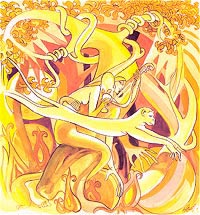
Verse 334. The Increase Of Craving
As creeping ivy craving grows
in one living carelessly.
Like this, one leaps from life to life
as ape in the forest seeking fruit.

Verse 335. How Craving Increases
Whomsoever in this world
this wretched clinging craving routs
for such a one do sorrows grow
as grass well-soaked with rain.
Explanation: If some one is overcome by craving which is described as lowly and poisonous, his sorrows grow as swiftly and profusely as birana grass, after being exposed to repeated rains.

Verse 336. Escaping Craving
But whoever in the world
routs wretched craving hard to quell,
from such a one do sorrows fall
like water drops from lotus leaf.
Explanation: Craving is a lowly urge. It is difficult to escape craving. But, in this world, if someone were to conquer craving, sorrow will slip off from him like water off a lotus leaf.

Verse 337. Uprooting Craving
Prosperity to you, I say,
to all assembled here!
When needing grass’s fragrant root
so craving extirpate.
Don’t let Mara break you again
and again as a torrent a reed!
Explanation: All those here assembled, may you all be well. I will advise you towards your well-being. The person who is keen to get sweet-smelling usira roots must first dig up the birana grass roots. In the same way, dig up the roots of craving. If you did that, Mara – death – will not torture you over and over like a flood crushing reed.
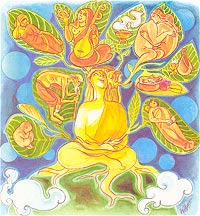
Verse 338. Craving Uneradicated Brings Suffering Over and Over
As tree though felled shoots up again
it its roots are safe and firm
so this dukkha grows again
while latent craving’s unremoved.
Explanation:Even when a tree has been cut down, it will grow up again if its roots are strong and unharmed. Similarly, when traces of craving remain, the suffering is likely to arise again and again.

Verse 339. Caught In The Currents Of Craving
For whom the six and thirty streams
so forceful flow to seeming sweet
floods of thought that spring from lust
sweep off such wrong viewholder.
Explanation: If in a person the thirty-six streams flow strongly towards pleasurable thoughts, that person of depraved views will be carried away on those current of craving.

Verse 340. The Creeper of Craving
Everywhere these streams are swirling,
up-bursting creepers rooted firm.
Seeing the craving-creeper there
with wisdom cut its root!
Explanation: The streams of craving flow towards objects everywhere. As a result, a creeper springs up and flourishes. The wise, when they see this creeper, should cut its root with wisdom.
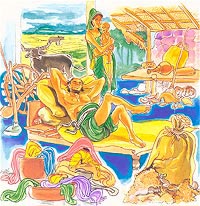
Verse 341. Bliss Does Not Come Through Craving
To beings there are pleasures streaming
sticky with desire,
steeped in comfort, happiness seeking,
such ones do come to birth, decay.
Explanation: Craving arises in people like flowing streams. These flow towards pleasure and sensual satisfaction. Such people who are bent on pleasure will experience repeated cycles of birth and decay.
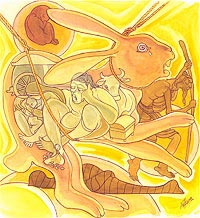
Verse 342. The Bonds That Entrap Men
Who follow craving are assailed,
they tremble as the hare ensnared,
held fast by fetter and by bonds
so long they come to dukkha again.
Explanation: Surrounded by craving the masses tremble like a hare caught in a trap. Shackled by ten fetter and seven sangas, men and women suffer again and again over a long period of time.

Verse 343. Nibbana By Shunning Craving
Who follow craving are assailed,
they tremble as the hare ensnared,
so let a bhikkhu craving quell
whose aim is passionlessness
Explanation: Surrounded by craving the masses tremble like a hare caught in a trap. Therefore, a monk desiring to attain detachment – Nibbana – should shun craving.

Verse 344. Freed From Craving Runs Back To Craving
Who without woodness inclines to the wood.
Free in the wood to woodness returns.
Do now regard that person well
who free returns to fetter.
Explanation: Having left the forest of desire he takes to the forest of the practice (i.e. the life of a monk); but when he is free from the forest of desire he rushes back to that very forest. Come, look at that man who having become free rushes back into that very bondage.
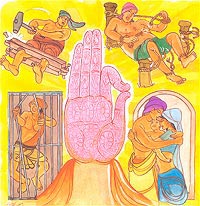
Verse 345. Bonds Of Attachment
Neither of iron nor wood nor hemp
is bond so strong, proclaim the wise,
as passion’s yearn for sons, for wives,
for gems and ornaments.
Explanation: The yearning for sons and wives are a stronger attachment than all the physical bonds made of iron, wood or hemp. Therefore, consider how to deal with this basic desire with wisdom.

Verse 346. Bonds Are Strong, But The Wise Get Rid Of Them
That bond is strong, proclaim the wise,
down-dragging, pliable, hard to lose.
This passion severed, they wander forth
forsaking sensual pleasures.
Explanation: The wise agree that this is a strong bond. It tends to deprave. Though this seems a lax knot, it is difficult to untie it to be free. However difficult the process is, freeing themselves from yearning for sensual pleasures, the wise leave household life and become ascetics.

Verse 347. Spider Web Of Passion
Ensnared in passion back they fall
as spider on a self-spun web.
This passion severed, wander the wise
forsaking dukkha all.
Explanation: Beings who are infatuated with lust fall back into the stream of craving they have generated, just as a spider does in the web it has spun. The wise cutting off the bound of craving, walk on resolutely, leaving all ills (dukkha) behind.

Verse 348. Reaching The Further Shore
Let go before, let go the after,
let go the middle, beyond the becoming.
With mind released in every way
you’ll come no more to birth, decay.
Explanation: Give up the past, give up the future, give up the present. Having reached the end of existence, with a mind free (of all conditioned things), you will not again undergo birth and decay.

Verse 349. Craving Tightens Bonds
For one who’s crushed by thinking much
excessive lust from beauty’s sight,
for that one craving grows the more,
that one makes strong the bonds.
Explanation:In those whose minds are agitated and assailed by doubts and suspicions, whose passions and sensualities are sharpened, craving increases more and more. This makes the bonds tighter.
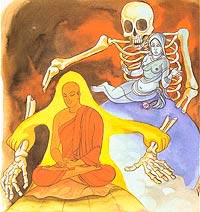
Verse 350. He Cuts Off Bonds Of Mara
But who delights in calming thoughts
develops constant mindfulness,
that one indeed will make an End,
will sever Mara’s bonds.
Explanation: He who is constantly engaged in dispelling the doubts and suspicions that assail the mind, is earnest and ever alert, looks on the world of reality as not pleasant. He will eradicate craving and will cut off bonds of death.
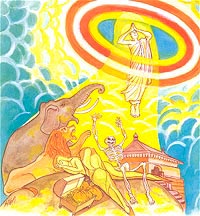
Verse 351. The Person Who Has Reached The Goal
One who’s fearless, reached the End,
of craving and of blemish free,
who has becoming’s thorn plucked out,
has this, a final body.
Explanation: He has come to cessation. He has reached the goal of his monastic life. He is free of fear, craving and is blemishless. He has broken the thorns of existence. This is his final being.
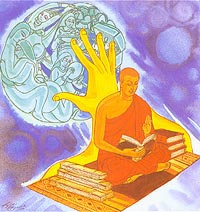
Verse 352. The Man Of Great Wisdom
One of clinging-craving free,
who’s skilled in way of chanting,
knowing the wording-sequence,
of what precedes and follows,
possessed of final body,
one greatly wise, great person called..
Explanation: He is free of craving and devoid of grasping. He is well versed in etymology and in usages. He is aware of characters and their deployment into combinations. He knows the sequence of letters. He knows the old dialect. This is his last body. That person is a great wise man.

Verse 353. Buddha Is Teacherless
Beyond all beings, wise to all,
unsoiled by dhamma all am I,
left all and freed by craving’s end,
by self I’ve known, whom teacher call?
Explanation: I have overcome all, I know all, I am detached from all, I have given up all; I am liberated from moral defilements having eradicated craving. Having comprehended the four noble truths by myself, whom shall I point out as my teacher.
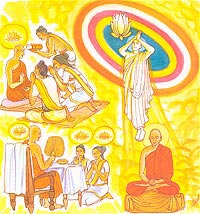
Verse 354. The Conquest Of All Suffering
Gift of Dhamma surpasses all gifts,
the Dhamma, its taste all other tastes beats,
delight in the Dhamma bests other delights,
destruction of craving conquers all ill.
Explanation: The gift of Dhamma excels all others gifts; the taste of Dhamma excels all other tastes; delight in the Dhamma excels all other delights. The eradication of craving overcomes all ills.
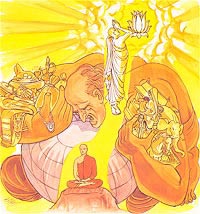
Verse 355. Wealth Destroys The Ignorant
Riches ruin a foolish one
but not one seeking the Further Shore,
craving for wealth a foolish one
is ruined as if ruining others.
Explanation: Wealth destroys the foolish; but it cannot destroy those who seek the other shore (i.e. Nibbana). By his craving for wealth the fool destroys himself, as he would destroy others.

Verse 356. Those Without The Bane Of Passion
Weeds are a fault of fields,
lust’s a human fault,
thus offerings to the lustless
bear abundant fruit.
Explanation: Fields have grasses as their bane. The ordinary masses have passion as their bane. Therefore, high yields are possible only through what is given to the passionless ones.
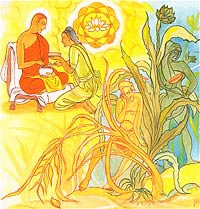
Verse 357. Those Without The Bane Of Ill-Will
Weeds are a fault of fields,
hate’s a human fault,
hence offerings to the hateless
bear abundant fruit.
Explanation: Fields have weeds as their bane. The ordinary masses have passion as their bane. Therefore, high yields are possible only through what is given to those without ill-will.
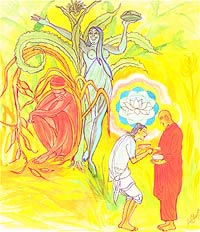
Verse 358. Those Without The Bane Of Illusion
Weed are the fault of fields,
delusion, human’s faults,
so gifts to the undeluded
bear abundant fruit.
Explanation: Fields have weeds as their bane. The ordinary masses have passion as their bane. Therefore, high yields are possible only through what is given to the one without illusion.

Verse 359. Those Without The Bane Of Greed
Weed are the fault of fields,
delusion, human’s faults,
so gifts to the desireless
bear abundant fruit.
Explanation: Fields have weeds as their bane. The ordinary masses have passion as their bane. Therefore, high yields are possible only through what is given to the one without desire.

